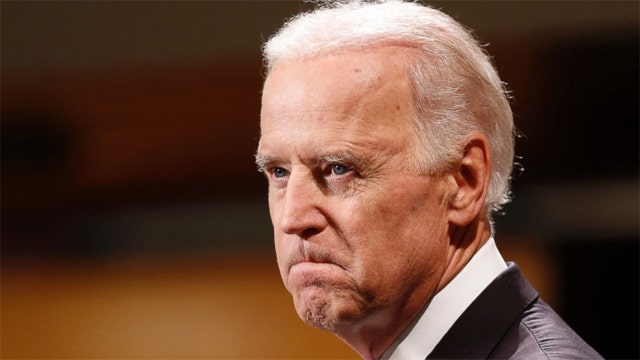Biden apologizes twice after offending allies in ISIS fight
VP suggested allies funded Al Qaeda-linked groups
This time, Joe Biden’s gaffes are causing an international fracas.
The vice president has apologized twice now for suggesting last week that key U.S. allies inflamed the situation in Syria by sending arms and money to extremists opposed to Bashar Assad.
The fallout over Biden’s remarks is perhaps unprecedented – his verbal miscues typically cause headaches for the White House, but otherwise are diplomatically harmless.
His off-the-cuff remarks Thursday at Harvard University, though, enraged U.S. allies, just days after the U.S. and several Arab nations launched a coordinated airstrike campaign against the Islamic State in Syria. The swiftness of Biden’s clean-up underscores the potential damage his remarks stood to do.
Two of the countries Biden mentioned – Saudi Arabia and the United Arab Emirates – had joined the U.S. in the airstrike campaign.
The incident also marks the latest in a line of remarks Biden has had to walk back, including a recent speech where he referred to bad actors in the housing market as "Shylocks" -- considered by some to be an offensive term for Jews. White House Press Secretary Josh Earnest was peppered with questions on Monday about these remarks specifically and Biden's tendency generally to make them.
"The vice president is somebody who has enough character to admit when he's made a mistake," Earnest said.
As for Biden's Syria comments, Saudi Arabia has not demanded an apology so far, but the UAE foreign minister reportedly blasted the comments as “far from the truth.”
The vice president’s office put out a statement saying that on Sunday, Biden spoke with Mohammed bin Zayed Al Nahyan, crown prince of Abu Dhabi and a key Emirati leader, to thank him for the country’s “strong support” in the fight against the Islamic State, or ISIS.
“He clarified that his recent remarks regarding the early stages of the conflict in Syria were not meant to imply that the UAE had facilitated or supported ISIL, Al Qaeda, or other extremist groups in Syria,” the statement said.
A day earlier, Biden’s office said he likewise spoke with Turkish President Recep Tayyip Erdogan to “clarify” his comments about that country's involvement. “The Vice President apologized for any implication that Turkey or other Allies and partners in the region had intentionally supplied or facilitated the growth of ISIL or other violent extremists in Syria,” the statement said.
The unusual episode raised the question of whether President Obama considered Biden's comments to be wrong -- or just diplomatically ill-timed.
On Monday, Earnest declined to comment in detail on whether the administration believes these countries did in fact inflame the situation inside of Syria. He said Biden's apology to Erdogan related specifically to him "mischaracterizing the [Turkish] president's views in a private conversation."
He stressed that these countries "understand the threat" posed by the Islamic State and said the U.S. is focused on "ensuring that we can work with other countries in the region to prevent support flowing to extremists who are operating in the area."
In the wake of Biden's remarks, Earnest claimed the White House doesn't see these countries treating the fight against ISIS as "anything less than a top priority."
He nevertheless acknowledged that the fact Biden made those phone calls "is an indication that he himself wishes that he had said it a little bit differently."
Biden spoke at length about the Islamic State fight last Thursday. The vice president, in a sweeping statement, said that "our biggest problem is our allies" in responding to the civil war in Syria.
"The Turks … the Saudis, the Emiratis, etc. What were they doing? They were so determined to take down Assad and essentially have a proxy Sunni-Shia war," Biden said.
"What did they do?” he continued. “They poured hundreds of millions of dollars and thousands of tons of weapons into anyone who would fight against Assad -- except that the people who were being supplied were al Nusra and al Qaeda and the extremist elements of jihadis coming from other parts of the world."
He also suggested Erdogan told him privately: “You were right. We let too many people through.”
Erdogan reportedly denied making such remarks and said Biden would become "history to me" over the comments unless he apologized.
Turkey, a NATO ally, is expected to define the role it will play in the U.S.-led coalition against the Islamic State militants who have captured a swath of Iraq and Syria, in some cases right up to the Turkish border.
Despite the fallout over the vice president’s remarks, some observers said the real problem wasn’t the veracity of the allegation – but the fact he leveled the charge publicly.
“What he said was actually right, but he shouldn’t have said it,” said KT McFarland, Fox News analyst and former security official in the Nixon, Ford and Reagan administrations.
Former Obama adviser David Axelrod offered a similar take Monday on MSNBC.
A column in The Daily Beast ran under the headline: “VP Biden Apologizes for Telling Truth About Turkey, Saudi and ISIS.”
For Biden, though, it was the latest in a recent string of stumbles.
Last week, while discussing the tragedy in Joplin, Mo., in which 161 people were killed in a devastating tornado, he misstated the death toll: "161,000 brothers, sisters, mothers, fathers, sons, daughters, grandparents lost," he said.
And at the same Harvard event last Thursday, he made an off-color remark when a questioner told him he was student body vice president
“Isn’t it a b-tch?” Biden responded. “Excuse me…the vice president thing.”
The Associated Press contributed to this report.





